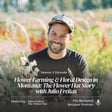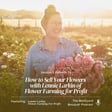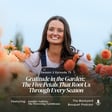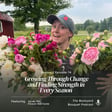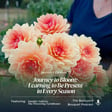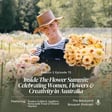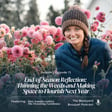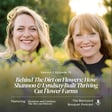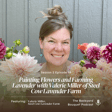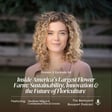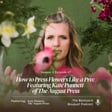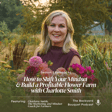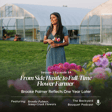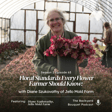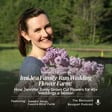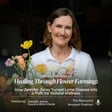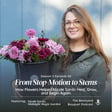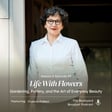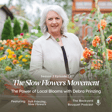
Ep. 27: Galena Berkompas: Scaling from Micro Flower Farm to 6-Acre Cut Flower Farm
Imagine turning a small urban garden into a flourishing ½ acre flower farm—all while homeschooling four kids and battling postpartum depression. That’s exactly what Galena Berkompas accomplished, and she’s here to share her inspiring journey on the Backyard Bouquet podcast. Galena transformed her life through the power of flowers, starting with little knowledge and a modest space in 2020, and has now grown into a successful flower farmer known for her sustainable practices and heartwarming story. Join us as we explore the therapeutic effects of gardening and how flowers brought joy and purpose back into Galena's life.
Balancing a bustling family life with a thriving flower farm is no small feat, but Galena has found a way to weave her children into her passion seamlessly. From homeschooling to farm chores, her young ones are learning the value of hard work and the wonders of nature. Galena opens up about the tough decisions she’s had to make, like dropping summer CSAs to focus on her family, and shares humorous anecdotes of her kids’ farm escapades. You'll also discover her strategies for maintaining profitability while nurturing her children’s education and childhood, as well as exciting future plans like selling seeds and expanding her farming operations.
But Galena’s story doesn’t end there. Learn how an unexpected Airbnb listing led her to the perfect 6-acre property and how she’s embracing organic and sustainable farming practices. Listen to her serendipitous tale of purchasing her dream farm, negotiating with sellers, and managing unexpected challenges. Galena’s social media success, nearing a million followers on Instagram, underscores her genuine connection with her audience and commitment to sharing her journey. Tune in to this episode for an uplifting and informative discussion on flower farming, family, and the serendipitous joys of life.
In This Episode You’ll Hear About:
- 00:02:10 - Galena's Inspiration for Flower Farming
- 00:04:30 - Transition from Hobby to Profitable Flower Farming
- 00:06:45 - Involving Kids in the Farming Process
- 00:10:35 - Balancing Business and Passion for Flower Farming
- 00:12:39 - Managing Profitability and Personal Preferences in Flower Farming
- 00:13:21 - Transitioning to a Larger Flower Farm Property
- 00:16:46 - Involving Family in the Farming Operation
- 00:21:45 - Balancing Work Ethic and Family Time on the Farm
- 00:27:13 - Finding the Perfect Property for Flower Farming
- 00:32:07 - Implementing Natural Pest Control Methods on the Farm
- 00:40:04 - Unexpected Discovery of New Farm Property
- 00:44:08 - Challenges and Successes in the Farm Property Purchase
- 00:49:46 - Impact of Social Media Presence on Flower Farming Journey
Shownotes: https://thefloweringfarmhouse.com/2024/06/25/ep-27-micro-flower-farm/
Learn More About Micro Flower Farm:
- Instagram: https://www.instagram.com/microflowerfarm/
- Facebook: https://www.facebook.com/microflowerfarm
- YouTube: https://www.youtube.com/channel/UCn62VzXv-XdA9Kq1hVpUolQ
- Website: https://www.microflowerfarm.com/
***Rate, Review, & Follow The Backyard Bouquet***
If you enjoyed this episode, will you please consider leaving the podcast a review? I'd love to know what you enjoyed most about the episode.
New episodes every Tuesday to help keep your garden blooming!
